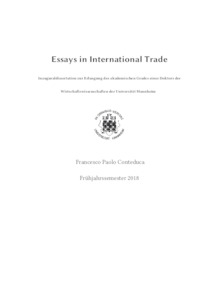|
Essays in international trade
Conteduca, Francesco Paolo
![[img]](https://madoc.bib.uni-mannheim.de/46142/1.hassmallThumbnailVersion/Conteduca_Dissertation.pdf)  Vorschau |
|
PDF
Conteduca_Dissertation.pdf
- Veröffentlichte Version
Download (2MB)
|
|
URL:
|
https://madoc.bib.uni-mannheim.de/46142
|
|
URN:
|
urn:nbn:de:bsz:180-madoc-461429
|
|
Dokumenttyp:
|
Dissertation
|
|
Erscheinungsjahr:
|
2018
|
|
Ort der Veröffentlichung:
|
Mannheim
|
|
Hochschule:
|
Universität Mannheim
|
|
Gutachter:
|
Nocke, Volker
|
|
Datum der mündl. Prüfung:
|
13 Juli 2018
|
|
Sprache der Veröffentlichung:
|
Englisch
|
|
Einrichtung:
|
Außerfakultäre Einrichtungen > GESS - CDSE (VWL)
Fakultät für Rechtswissenschaft und Volkswirtschaftslehre > VWL, Mikroökonomik (Nocke 2009-)
|
|
Fachgebiet:
|
330 Wirtschaft
|
|
Normierte Schlagwörter (SWD):
|
Außenhandel , Direktinvestition
|
|
Freie Schlagwörter (Englisch):
|
FDI, Multinational Enterprise, Demand Risk, Risk Aversion, Mergers, Greenfield Investment
|
|
Abstract:
|
Firm heterogeneity is crucial in determining firm-level decisions and, consequently, shaping the aggregate trade flows. Several studies have focused on this aspect, starting from the workhorse model of Melitz (2003). The fundamental insight of this literature is that firms are different along several dimensions (e.g. size and productivity). This difference necessarily reflects into their participation in the international markets; in particular, firms that are productive enough can select into exporting activity. Among those, only a narrow subset of them can afford the costs
associated with the multinational activity. The dissertation builds upon the economic framework
featuring heterogeneous firms and proposes two empirical self-containing contributions. In particular, the first chapter provides empirical evidence that multinational firms conducting horizontal FDI operate as risk averse agents. The second chapter analyzes the effects of the risk associated with quality perception in foreign markets on the entry mode selected by MNEs
operating in the service sector. For both analyses, we rely on the development and estimation of
structural models which allow us to run counterfactual analysis and evaluate the effects of policy
changes.
|
 | Dieser Eintrag ist Teil der Universitätsbibliographie. |
 | Das Dokument wird vom Publikationsserver der Universitätsbibliothek Mannheim bereitgestellt. |
 Suche Autoren in Suche Autoren in
Sie haben einen Fehler gefunden? Teilen Sie uns Ihren Korrekturwunsch bitte hier mit: E-Mail
Actions (login required)
 |
Eintrag anzeigen |
|
|
